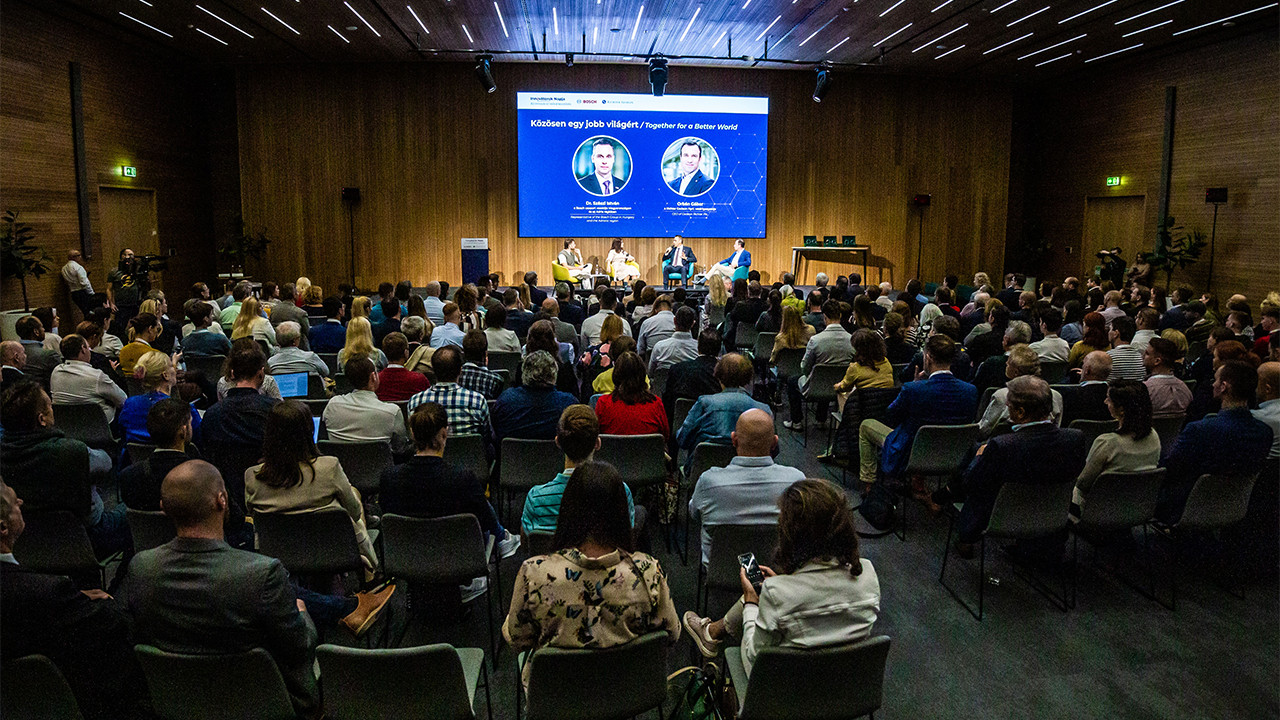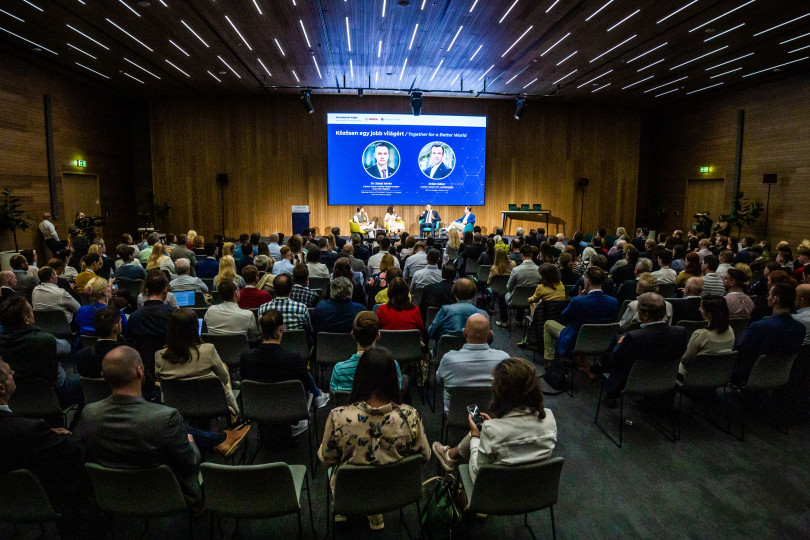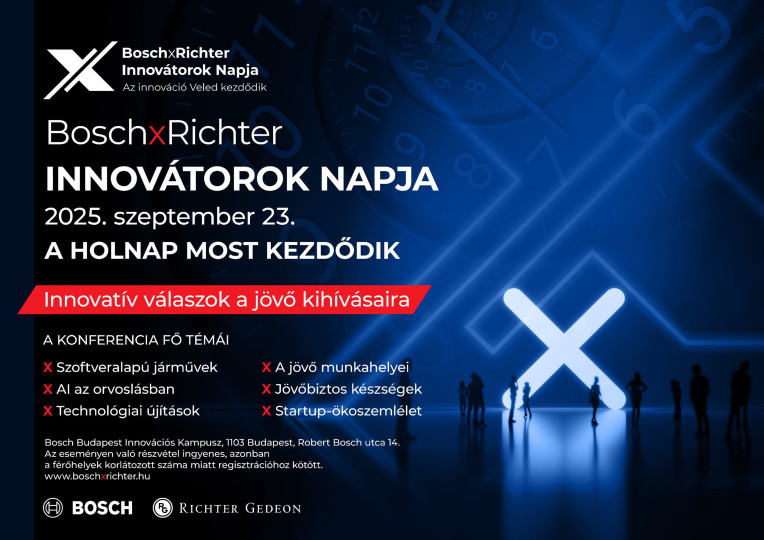Budapest – Our times are defined by rapid changes and complex challenges – economic and geopolitical turbulences require new strategies not only in everyday life, but also from large corporations. Where is innovation headed? What technological trends will shape the coming decades? What innovations do Hungarians have the most confidence in? And how can we “future-proof ourselves” as employees? The Bosch×Richter Innovators’ Day returns for the third time on September 23, at it will be hosted again at the Bosch Budapest Innovation Campus. The event will focus on the most pressing issues affecting our common future.
The free event — requiring prior registration — will feature renowned experts, including Dr. Árpád Rab, futurologist; Gábor Várkonyi, automotive market expert; Csongor Biás, managing director of Startup Hungary; Dr. Magor László Lőrincz, deputy director of research at the Department of Physiology, Albert Szent-Györgyi Medical School, University of Szeged; and Dr. Loránd Erőss, director of the Department of Neurosurgery and Neurointervention at Semmelweis University. They will be joined by leading specialists from Bosch and Richter, along with young innovators, all sharing their insights about the challenges impacting us in the coming decades.
The race against time: are four-wheeled software and robot doctors on their way?
Today, the question isn’t just what the future holds, but how quickly can we adapt to it. Trend-savvy corporations are competing with change through constant technological innovation. The Bosch×Richter Innovators’ Day will reveal how close are we to the dominance of software-based connected driving; what new capabilities this requires from companies; and how Europe and China stack up in this race. Experts will also take a look at how telemedicine is transforming healthcare, and how AI-driven treatments, gene therapy and biotechnology are opening up new horizons in our lifetime.
Startups and corporations: what can the big and small learn from each other?
Rapid adaptation, creative problem-solving and constant evolution – this is how startups are already trying to tackle tomorrow’s challenges today. Some argue that when business success is at stake, innovative large companies should also operate with a startup mindset. What can the big and small learn from each other? At the Innovators’ Day, we’ll explore how startup thinking can become the key to future business success and how it can drive renewal and growth – even in times of great uncertainty.
Future-proof strategies in the job market or what is required for personal competitiveness?
In fast-changing times, the labor market faces unexpected challenges: new professions are constantly emerging and it’s hard to predict exactly what knowledge, training and skills truly boost competitiveness. Experts at the Innovators’ Day will offer tips on building a “future-proof” career: they will explore what knowledge, experiences, and mindsets are necessary to help as many people as possible to succeed in the workplaces of the future.
Innovation top list: what do Hungarians believe in? – fresh results from the joint research of Bosch and Richter
The future is hardly imaginable without innovation, but how much does public opinion actually trust new technologies? Which innovative trends and technologies and what innovations do people expect a better future from? What solutions are expected to bring a significant difference into their lives? These questions are at the heart of Bosch’s and Richter’s latest joint “Innovation Top List” study – along with expert insights, fresh results about this will also be revealed at the Innovators’ Day.
Talents of the future: introducing Generation Z’s Bosch×Richter Industrial Innovation Award winners
The event will also welcome young innovators from Generation Z, who will present their future-oriented ideas: announced this year under the theme “See into the Future!”, the winners of the Bosch×Richter Industrial Innovation Award 2025 will present themselves. The joint Bosch and Richter award aims to encourage innovative thinking and the development of sustainable solutions among higher education students in the fields of mobility and healthcare.
Virtual smart manufacturing tour, AI-based robots – the future unveiled through futuristic demonstrations
Alongside roundtable discussions probing the secrets of the future, visitors will get a taste of Bosch’s and Richter’s latest developments through futuristic on-site demonstrations. At Innovators’ Day, guests can meet intelligent robotic arms and mini cars at the Bosch Budapest Innovation Campus. Attendees will have the chance to embark on a virtual factory tour, explore how eBike drives work, gain exclusive behind-the-scenes insights into AI-driven smart factories, and even interact with an AI-powered robot dog that speaks Hungarian.
The Bosch×Richter Innovators’ Day is free to attend but registration is required. (Space is limited!) More information, detailed program and registration: https://boschxrichter.hu/home/
Zita Hella Varga
Phone: +36 70 667-6374
Bosch has been present in Hungary since 1898 with its products. After its re-establishment as a regional trading company in 1991, Bosch has grown into one of Hungary’s largest foreign industrial employers with currently eight subsidiaries. In fiscal 2024 it had total net sales of 2.058 billion forints and consolidated sales to third parties on the Hungarian market of 313 billion forints. The Bosch Group in Hungary employs more than 17,400 associates (as of December 31, 2024). In addition to its manufacturing, commercial and development business, Bosch has a network of sales and service operations that covers the entire country.
The Bosch Group is a leading global supplier of technology and services. It employs roughly 418,000 associates worldwide (as of December 31, 2024). The company generated sales of 90.3 billion euros in 2024. Its operations are divided into four business sectors: Mobility, Industrial Technology, Consumer Goods, and Energy and Building Technology. With its business activities, the company aims to use technology to help shape universal trends such as automation, electrification, digitalization, connectivity, and an orientation to sustainability. In this context, Bosch’s broad diversification across regions and industries strengthens its innovativeness and robustness. Bosch uses its proven expertise in sensor technology, software, and services to offer customers cross-domain solutions from a single source. It also applies its expertise in connectivity and artificial intelligence in order to develop and manufacture user-friendly, sustainable products. With technology that is “Invented for life,” Bosch wants to help improve quality of life and conserve natural resources. The Bosch Group comprises Robert Bosch GmbH and its roughly 490 subsidiary and regional companies in over 60 countries. Including sales and service partners, Bosch’s global manufacturing, engineering, and sales network covers nearly every country in the world. Bosch’s innovative strength is key to the company’s further development. At 136 locations across the globe, Bosch employs some 87,000 associates in research and development.
Additional information is available online at www.bosch.hu, iot.boschblog.hu, www.bosch.com, www.iot.bosch.com, www.bosch-press.com, www.twitter.com/BoschPresse
About Richter
Richter strives to be a global innovator in several key scientific areas, while committed to making medicines more accessible worldwide. Founded in 1901 and headquartered in Hungary, the company had a market capitalization of €4.7 billion and generated revenues of €2.2 billion in 2024. Richter operates Central Europe’s largest pharmaceutical R&D hub. It conducts groundbreaking research in the fields of neuropsychiatry and gynecology, while biotechnology and generic products strengthen its „affordable” treatment portfolio. Dedicated to sustainable growth, Richter invests in research and development, manufacturing excellence, and digitalization to drive medical innovation. For more information, visit: www.gedeonrichter.com.





